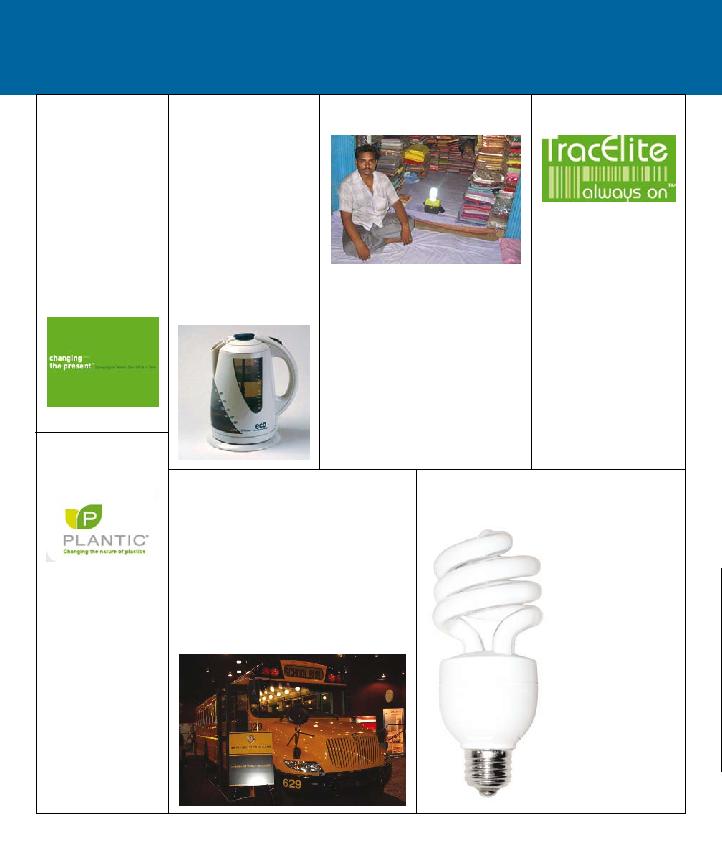
Time," http://ChangingThePresent.
org allows you to protect an
acre of the rainforest, invest in a
sanitation programme or promote
environmental education.
You can invest in environmental
research, fund a lawyer
defending land rights or help
fight climate change. And
that's just on the environment.
ChangingThePresent offers
something for virtually any cause.
a makeover thanks to IC Corporation, USA's largest school bus manufacturer,
and Enova Systems, a leading provider of hybrid drive systems. As a result of an
initiative called the Plug-In Hybrid Electric School Bus Project, 9 hybrid buses
have been awarded to states around the country by Advanced Energy, a non-
profit corporation that initiated a buyer's consortium of school districts, state
energy agencies and student transportation providers. The new hybrid school bus
technology could reduce emissions by 90 per cent. An added benefit: as school
buses are generally not air conditioned, their windows are commonly open in
warm weather. Children are therefore exposed to diesel exhaust during pickup and
drop-off. The hybrid system promises reduced exposure diesel particulate matter.
Environment, Food and Rural Affairs (DEFRA):
"If everyone boiled only the water they needed
to make a cup of tea instead of `filling' the kettle
every time, we could save enough electricity to
run practically all the street lighting in the U.K."
The Eco Kettle has a patented dual reservoir, one
of which holds .5 litres of water, along with a
measuring button which allows any quantity
-- from a single cupful to full capacity -- to
be released into a separate boiling chamber,
saving consumers up to 30 per cent of energy
compared with a normal kettle. The kettle has a
3 kilowatt stainless steel concealed element, a
washable limescale filter, and a locking lid.
spearheaded by Royal Philips Electronics, aims to provide affordable,
high-quality, energy-efficient lighting where it is most needed.
Two lighting solutions are the heart of SMILE: a rechargeable
portable lantern, and a hand-cranked LED flashlight. In partnership
with UNEP Sasakawa Environment Prize winner Development
Alternatives, Development of Humane Action Foundation and
MART Rural Solutions, Philips is developing a business model that
will allow families to light their homes without creating indoor air
pollution or risking fire. Currently available in four Indian States,
the programme will soon be rolled out to eight more. The products
also benefit shopkeepers, night fishermen, and children studying
at home.
6680.html
a major contributor to climate change.
Developed by the Tropical Forest Trust,
TracElite is a global computerized system that
tracks wood from stump to store aiding the
battle against illegal logging and helping
consumers choose sustainable products.
Under the system, which has been tested in
Indonesia, a tree destined for legal felling is
given a unique barcode identifying its type
and location, which it carries all through
the process from forest to furniture. When
the barcode is scanned, a server in London
verifies the information. Because the system
functions via the Internet, it is always on.
Wholesalers and retailers can act immediately
to identify problems before products
containing wood of unknown origin are
manufactured, packaged and shipped.
plastics" is the slogan of
Plantic, an Australian based
biodegradable materials
technology company. Plantic
Technologies has developed an
entirely biodegradable, water
soluble and organic alternative
to conventional plastics based
on non-genetically modified
corn. One its latest uses was
on So Organic Easter Eggs from
Sainsbury. According to an article
in The London Times, Sainsbury's
use of this new bioresponsible
packaging could save seven
tonnes in landfill waste.
Turnbull made global headlines in
February 2007 when he announced that
Australia would phase out incandescent
light bulbs in a bid to curb greenhouse
gas emissions. Yellow incandescent
bulbs, which have been in use virtually
unchanged since their invention in the
9th century, will be replaced by more
efficient compact fluorescent bulbs by
2009. Approximately 95 per cent of the
power consumed by an incandescent
light bulb is emitted as heat, rather than
as visible light., With less than 5 per cent
efficiency, an incandescent light bulb
is about one quarter as efficient as a
fluorescent lamp, which is about 20 per
cent efficient. Banning incandescent bulbs
could cut 800,000 tonnes of carbon from
Australia's current emissions by 202
and lower household lighting costs by
66 per cent.
minister/env/2007/pubs/mr23apr07.pdf